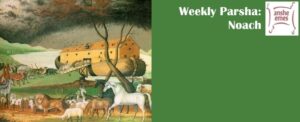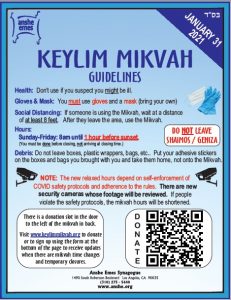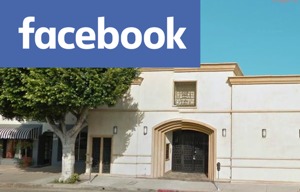NOACH 5757 & 5762
I. Summary
A. Noah and the Ark. Noah was a righteous man in an evil generation. Hashem beheld the world’s sad state and decided to bring a flood to destroy the entire population except Noah and his family. He told Noach of His decision and instructed him to build a three-story ark in which to dwell during the flood. Noach followed Hashem’s instructions and completed the ark 120 years later. Noach, his wife and three sons (Shem, Chom and Yafes) and their respective wives entered the ark, along with seven pairs of each kosher animal and one pair of every other living creature (plus appropriate food for all of the inhabitants).
B. The Flood. On the Seventeenth day of the second month, rain began to fall; it fell with increasing intensity for forty days/nights, drowning virtually every living thing outside the ark. The deluge was so great that almost six months elapsed before the waters had subsided enough to allow the ark to come to rest on the mountaintop of Ararat.
C. The End of the Flood. After almost another three months, Noach released a raven from the ark to see if there was dry land; the raven, however, merely flew to and fro, waiting for the water to dissipate. Seven days later, Noach sent out a dove who, finding no resting place, quickly returned to the ark. Noach sent another dove seven days later; this time, the dove returned with an olive branch indicating that the waters were receding. Finally, seven days later, the dove didn’t return signaling that the land had at last begun to dry up. Noach then removed the ark’s covering and departed after a stay of 1 year and 11 days (i.e,. a solar year). Noach offered sacrifices of gratitude to Hashem. Hashem was pleased with Noach’s sacrifices and promised that He would never again destroy all of mankind by flood. Hashem then placed a rainbow in the sky and told Noach that it would always be a symbol of this promise.
D. The Earth is Repopulated. The earth is repopulated through Noach’s sons and the founders of numerous nations appeared. (See the Artscroll Chumash for a list of the seventy nations.) Yet, all of mankind spoke only one language, “Loshon Hakodesh” (the holy language). Unfortunately, mankind didn’t learn from the flood and returned to its evil ways.
E. The Tower of Babel. The different nations convened and proposed to build a city with a tower reaching heaven. Chazal explain that these wicked people weren’t satisfied with the earth alone for their dwelling place, asking “why Hashem should have the heaven all for Himself?” They decided to build a colossal tower, scale it and conquer the heavens. Hashem frustrated their plan by confusing the speech of the builders, so that they couldn’t understand each other. The city was thus called Babel (“mixing”), since Hashem mixed the languages of the people of the earth.
F. From Noach to Avrom (later known as Abraham). There were ten generations between Noach and Avrom (see attached chart). Noah died at 950, at which time Avrom was 58. Avrom lived in Uhr Kasdim, where he realized Hashem’s oneness and risked his life to follow Him and not to worship idols.
II. Divrei Torah
A. Lil’Mode U’lilamed (Rabbi Mordechai Katz)
1. Hashem waits patiently for repentance. There were ten generations between Adam and Noach, each progressively more immoral. Yet, Hashem waited before destroying mankind, hoping that it would use its free will to repent from their evil ways. Even after Hashem decided to bring the flood, he commanded Noach to build the ark, a process which took 120 years, again hoping that mankind would repent. Furthermore, the rain lasted forty days/nights, becoming progressively stronger. Once again, Hashem gave man the opportunity to repent. Hashem is patient in accepting repentance, and even goes to great lengths to encourage it.
2. The greatness of peace. The generation of the Flood had no fear of G-d, and engaged in all types of immoral and destructive activity (“the earth was filled with robbery”). But, the generation of the Tower of Babel was even worse — they rebelled directly against Hashem’s authority. Why, then, was the former destroyed and the latter merely dispersed? Chazal teach us that the generation of the Tower had one significant merit which led to Hashem’s leniency — shalom (peace). As wicked and defiant as they were against Hashem, there was peace and harmony among them. This serves as a powerful lesson to us of the importance of peace and brotherhood.
3. Noach vs. Abraham. The Torah states “Noach was a man righteous and wholehearted in his generation.” Chazal interpret this to mean that he was only righteous when compared to others in his generation, but that his righteousness would have been outshone by Abraham had they lived at the same time. Why? While Noach was pious, his piety didn’t carry over to others — besides his family, there was no one else who was under his influence and worthy of joining them on the ark; Noach never prayed on behalf of the world prior to the flood. Abraham, however, was pious and his piety had a profound effect on those around him — he fought against idolatry; was meritorious in the mitzvah of “Hachnosas Orchim” (hospitality), using it as a vehicle to bring others closer to Hashem; beseeched Hashem to spare the city of S’dome, etc. As Peninim on the Torah (Rabbi A.L. Scheinbaum) states, “one may succeed in amassing a great fortune, but if the world doesn’t benefit from his/her wealth, what good has it brought?” A lesson to be derived from Noach’s tragic yet glorious life is that one cannot create a better place to live and a Jewish home life only for him/herself. We must exercise our positive influence on our family and on the society in which we live.
B. Growth Through Torah
1. Seek the company of people from whom you can learn positive qualities. “Noach was a completely righteous person in his generation”. In addition to the interpretation noted above, Chazal also note that means that Noach was righteous even in an evil generation. The Chasam Sofer notes that both interpretations are correct and not necessarily inconsistent. If Noach would have stayed the way he was in his own generation, then he wouldn’t have been special in Abraham’s generation. But, had Noach been in Abraham’s generation, he would have likely been influenced positively by Abraham, and would have been greater than he actually was. We are all influenced by our surroundings. When we are close to people who act in an elevated manner, we are positively influenced.
2. You become elevated when you help others improve. “Noach walked with the Almighty.” Sforno explains that Noach walked in Hashem’s ways, which means to do good to others. How? The people acted corruptly and Noach tried to teach them how to improve their actions. As Rambam teaches, the highest level of charity is to help a person earn a living on his/her own. When you help a person become self-sufficient financially, spiritually or otherwise, you help him/her not just once but for the rest of his/her live. Not only will he/she be able to do many more good deeds, but you will have a positive influence on his/her children and grandchildren.
3. Strive for harmony even with people who are different from you. The rainbow symbolizes peace and unity. A rainbow is made up of different colors which come together to make one entire whole. Similarly, people are different from each other. But if we look at ourselves as one unit, there can be peace and harmony despite our differences.
C. Majesty of Man (Rabbi A. Henach Leibowitz)
Noach and the Yonah (Dove). As noted above, when the rains ceased, the dove returned with a dove branch. The Gemara tells us that by bringing the bitter-tasting leaf (something a dove wouldn’t ordinarily eat), the dove was in essence saying “I would rather eat food as bitter as olive leaves from the hand of Hashem, than something sweet as honey from the hand of flesh and blood.” (Rashi comments that “flesh and blood” refers to Noach.) Why does Rashi point this out? Isn’t it obvious? Rashi is pointing out that the dove preferred bitter leaves found on his own to relying even on Noach. Despite the fact that Noach was a kind and gentle man who went to great pains to ensure the comfort and nourishment of the animals on the ark, the dove still preferred to rely on himself. Rashi is giving us much greater insight into the nobility and greatness of man — our soul feels pain at having to turn to another person for our needs instead of receiving them directing from Hashem (as we pray in the Birkas HaMazon, ” . . . let us not be need of the gifts of human hands or their loans, but only of Your hand, which is full, open, holy and ample.”). No matter how graciously help is offered, it still hurts to accept. Thus, the dove was telling Noach, and all of us, that we must be extremely sensitive to the feelings of others, and do a favor for another person both graciously and compassionately.
D. Kol Dodi (Rabbi David Feinstein)
Noach did as Hashem commanded him. “Noach did so; just as G-d commanded him, so he did.” The last few words seem redundant. What do they teach us? The Torah is testifying that Noach acted correctly, even uprightly, in keeping the spirit of Hashem’s command. Rashi notes that Noach spend 120 years building the ark so the people of his generation would ask him what he was doing, and he could warn them to repent before the flood was brought. He knew that if they repented and the flood was averted, he would look like a fool who toiled “in vain” for 120 years to build the ark. And yet, he continued his work for the entire time with the correct frame of mind. He understood the process of building was desirable in and of itself and that even if the ark was never used, he would still have done Hashem’s will by performing the commandment he personally had been given. We must approach the performance of mitzvos with the correct attitude — we must rejoice in the mitzvah for its own sake, because we know we are doing Hashem’s will with the correct attitude.
E. In the Garden of the Torah (the Lubavitcher Rebbe, Rabbi Menachem M. Schneerson, z’tl).
Genuine satisfaction; Noach’s legacy.
1. Our Potential; Being Sensitive To G-d’s Cues. The Maggid of Mezritch (a disciple of the Bal Shem Tov, and mentor of the Alter Rebbe, the first Lubavitcher Rebbe) interpreted our Sages’ statement “know what is above you” as “know that everything above — all that transpires in the spiritual realms — is from you,’ dependent on your conduct.” Each of us has the potential to influence the most elevated spiritual realms, which potential is alluded to in this week’s Parsha. The word “Noach” means “rest” and refers to satisfaction and repose. Noach — and by extension each of us — can peace and tranquility in our fellow man and, in so doing, accentuate similar qualities in the worlds above. Yet, the Parsha, which deals in large part with the flood and the Tower of Babel, seems diametrically opposed to the satisfaction and repose personified by Noach. This opposition underscores the interrelation between the patterns with which Hashem imbued the world and man’s response to them. Noach’s birth was to bring about a period of repose and satisfaction; however, mankind failed to give up it evil ways and do teshuvah (repentance).
2. Rains of Blessing. Chazal teach that the rains initially descended with “mercy”; that is, if mankind had repented, they would have been rains of blessing; since they didn’t, they became a flood. In a way, however, the rain water nonetheless remained waters of blessing. Just as immersion in a mikveh is associated with re-experiencing the act of creation, so too did the rains of the flood bring about the dawning of a new age: “Noach saw a new world”. Thus, the waters of the flood are called the “waters of Noach” because the intent — and the actual effect — was to bring rest and pleasure to the world. Unfortunately, because man didn’t respond positively, this constructive outcome was coupled with destruction.
3. The Rainbow. On the ark, various predators peacefully co-existed. This foreshadows the coming of the ultimate time of peace and satisfaction — the Messianic Age, when “the wolf will dwell with the lamb, and the leopard will lie down with the young goat” and “there will be neither famine nor war, neither envy nor competition, for good things will flow in abundance.” By vigorously following in Abraham’s footstep, spreading love and kindness, we can help bring about this Age of ultimate peace and satisfaction and, like Noach and his family, merit the shining of the rainbow.
F. Living Each Week (Rabbi Abraham Twerski).
1. Concern for Others. The Talmud explains that the reference to the flood as being the “waters of Noach,” as though Noach was responsible for the flood, is due to the fact that he did not intercede to ask for mercy for his generation. It is not enough to be a just and right person. If we do not see beyond our personal salvation, we are remiss.
2. We Are Judged By How We Treat Others. The Baal Shem Tov teaches that just as a shadow corresponds to the movements of the subject, G-d acts towards us according to the way we act. Noach’s lack of consideration for his generation resulted in his loss of Divine favor. However, his attending to the needs of the living things that were with him in the Ark restored him to his previous state of favor. We may think that kind behavior to others is altruistic; in truth, however, we are the ultimate beneficiaries of our benevolence.
3. Comfort vs. Fulfillment. “G-d spoke to Noach, saying ‘go forth from the Ark . . . . . [bring forth] with you every living thing. . .'” Rashi notes that the sentence lends itself to two interpretations: “bring forth” all living things from the Ark if they are willing to emerge or “coerce them to leave” if they are not. Why would any living thing refuse to leave the Ark, whose conditions were hardly ideal? Like these living things, we often opt to remain in a rut to which we have become accustomed rather than better our circumstances, since the latter may require adaptation.
G. Reflections On The Sedra (Rabbi Zalman I. Posner).
Remaining True to Our Principles. The Parsha begins with the statement that Noach was a righteous man “in his generation.” Chazal interpret this verse to mean that Noach was righteous in the face of the wicked generation in which he lived and alternatively that only in his degenerate generation would he be considered righteous. Is the latter (i.e. dismissing Noach’s piety as only better than the rampant immorality of his time) fair to him? His very ability to be different — better than this contemporaries — is itself worthy of admiration. Being good among good people is not surprising. Maintaining our identity and principles in the face of opposition, made Noach (and has the potential to make each of us) immortal.
H. Darash Moshe (Rav Moshe Feinstein, zt’l).
Pure Observance. When G-d first told Noach of His plan to destroy all flesh, He did not mention that He intended to do so by bringing a flood. Rather, He commanded Noach to build an Ark, and only then informed him of the impending flood. Wouldn’t it have been more logical for G-d to first warn Noach about the flood and then command him to build an Ark? G-d proceeded in this order so that Noach would build the Ark entirely for the sake of fulfilling His commandment, rather than to save himself from the flood. From here we learn an important principle that applies to all mitzvos: even when we think we understand the reasons for a mitzvah, we must nonetheless observe it purely because G-d commands us to do so.
I. Torah Gems (Rabbi Aharon Yaakov Greenberg).
1. “These Are The Generations Of Noah: Noach was a righteous man. . .”
a. The definition of a righteous person is based not on the righteousness of his or her predecessors, but rather on his/her moral character and good deeds (Kol Yisrael).
b. As noted above, some commentators note that Noach was only righteous in comparison to those in his generation, whereas others note that had he lived in a generation of righteous people he would have been even more righteous. R’ Bunim of Pshischa said that each Jew must place two slips of paper in his/her pocket – one which reads “I am but dust and ashes” and the other which reads “for my sake was the world created”. These are two qualities in us, and we must use each as necessary. When the evil inclination wishes to show us how great we are in order to make us haughty, we should remember the former. When the evil inclination wishes to bring us despair by showing how low we are, we should remember the latter.
c. Rashi was very careful in his choice of language: “there are those of our Rabbis who interpret this [Noach’s righteousness] complimentary” — those who interpret as complimentary are referred to as our “Rabbis”. “And there are those who interpret it disparagingly” – those who do so lose the title of “our Rabbis,” because one must always give others the benefit of the doubt. (R’ Yaakov David of Amshinov).
2. “The Earth Was Corrupt”. The sin of the generation of the flood was that the people preferred the “earth” – their material wants – over their spiritual needs. (The Magid of Mezritch).
3. True Harmony. I do set My bow in the cloud, and it will be for a token of a covenant between Me and the earth.” How does the rainbow symbolize peace, unity and the continued existence of the world? It is because it is composed of a number of colors, shades and hues, all of which unite into a single whole. The same is true with the differences between people, groups and nations. A life based on mutual understanding and tolerance, on harmony and peace, is the basis for the existence of the world, “a token of the covenant between Me and the earth.” (Z. Hillel)
4. Our Potential Influence. The Maggid of Mezritch interpreted the statement “know what is above you” as “know that everything ‘above’ – all that transpires in the spiritual realms – is from you, dependent upon your conduct. Each of us has a potential to influence even the most elevated spiritual realms.” The Lubavitcher Rebbe, zt’l commented that the Torah alludes to this potential in the verse “these are the generations of Noach. Noach was a righteous man.” The name “Noach” refers to satisfaction and tranquility. The Hebrew “Noach” means “rest” and suggests the word “nachas”, pleasure. The Torah implies that Noach and his descendants implanted these two qualities among their fellow men and the spiritual world above. Each of us affects our environment. Therefore, our thoughts, words and deeds can inspire peace and tranquility by helping create meaningful pleasure.
5. The Trait of Mercy. On the verse “And G-d saw that the wickedness of man was great upon the earth,” the Radamsker noted that in the Midrash we are told that Abraham asked Noach’s son Shem how they were saved by the flood. He answered that they had mercy on the animals and birds so G-d had mercy on them. The Radamsker noted that if we would have mercy on each other, we will awaken the mercy above and we, too, would be saved.
6. Our Light. On the verse “You shall make a window for your teyvah ” (teyvah can mean “Ark” or “word”), the S’fas Emes noted that we should bring light to the word. On this verse, the Baal Shem Tov commented that we should make sure that what emanates from our mouth will enlighten others.
J. Vedibarta Bam (Rabbi Moshe Bogomilsky).
1. True Righteousness. “These are the offspring of Noach: Noach was a righteous man, perfect in his generation; with G-d Noach walked.” Given the fact that the Torah is so concise, why does it describe Noach’s virtues in such detail? Some people are meticulous in observing their duties towards G-d, while others are very careful in their relationships with their fellow man. In this verse, the Torah tells us that Noach was perfect since he was successful on both fronts.
2. Righteousness in All Contexts. Is the reference in the above quote to Noach being “perfect” and “walk with G-d” redundant? There are many different types of people. Some observe Torah and mitzvot at home, but are lax in public. Others appear pious in public, but are lax at home. The Torah is testifying that Noach was truly righteous – when he was among the people of his generation he was observant, and when he was alone with only G-d to see his behavior, he walked in G-d’s path.
3. True Peace. “They and all the animals [were in the Ark]. ” The prophet Isaiah includes in the miraculous events of the days of Mashiach that “the wolf will dwell together with the lamb”. This was also experienced in the days of Noach. What is so unique about the days of Mashiach? In the time of Noach, the world was in danger of destruction and annihilation; therefore, it was natural for enemies to become friends and live together since they shared the common goal of survival. In the days of Mashiach, there will no longer be any war and there will an abundance of goodness. Unfortunately, in prosperous and tranquil times, people often find time for strife and fighting. Isaiah therefore foretells of a miracle that will occur in the Mashiach – despite the abundance of good, there will be absolute peace.
K. There Shall Be Light (Rabbi Yitzchak Meir Goodman)
Our Friend the Yetzer Hara. ” . . . sin crouches at the door, and its desire is to you, but you shall rule over it.” Contrary to popular belief, the yetzer hara (evil inclination) is not evil. Rather, it simply serves its G-d-given function, and in the end of days it will happily admit defeat. We can thus read the above verse as “although sin is by assignment crouching at your door, its desire is that you ultimately conquer it.” (R’ Gershon Stern)
The Jewish Home. “Make yourself an ark of gopher wood . . . ” R’ Aharon Levine explains that the ark represents the Jewish home. According to the Talmud, “gopher wood” is cedar – just as the cedar is lofty, so too must the Jewish home be; just as the cedar’s roots withstand even the strongest winds, the Jewish home must be resistant to heresy and skepticism; just as the cedar grows straight, our lives must be straight and honest. Moreover, just as the ark was lined with pitch on the both inside and out, so too must the Jewish home be strong and proud both inside and out. In addition, just as the ark needed a window, a Jew must not isolate him/herself within the four walls of his/her home, but must rather look out to the rest of world and help those in need. Furthermore, just as there was a door to the ark, a Jewish home should be open to all. Finally, the ark’s three levels correspond to the three pillars of the world – Torah, service of G-d and acts of kindness – which pillars form the hallmark of the Jewish home.




 Visit the group and request to join.
Visit the group and request to join.
